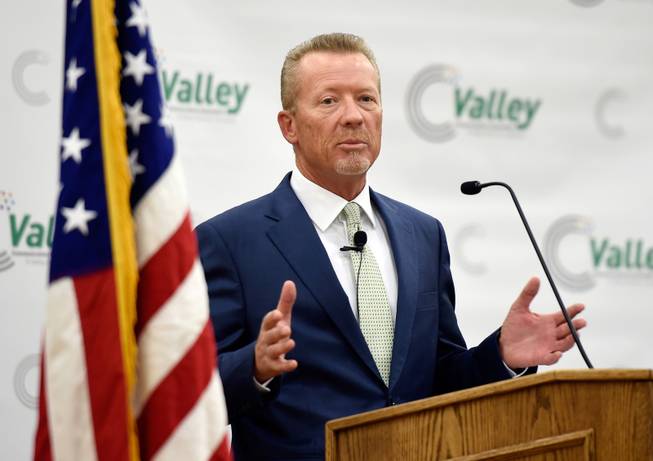
David Becker
Valley Electric Association CEO Tom Husted speaks during a ceremonial ribbon-cutting at Beatty High School on Friday, Sept. 15, 2017, in Beatty. Gov. Brian Sandoval and Valley Communications Association celebrated the connection of the company’s high-speed fiber to the Beatty school and the beginning of construction for the first all-fiber community in Nevada.
Friday, Oct. 27, 2017 | 2 a.m.
Related Coverage
Earlier this year, students at Beatty High School, a rural Nevada school about 120 miles from Las Vegas, were frustrated with online studies and assignments.
At home and school, students constantly lost their Internet connection while studying.
The dilemma was solved in September, when Valley Electric Association connected the town to a fiber-optic circuit. The connection had implications beyond education, including keeping the local hospital open.
It is only the beginning for Valley Electric Association’s planned transformation of rural Nevada, Thomas Husted, CEO of Valley Electric Association, said Tuesday on “Nevada Newsmakers.” (Valley Electric Association is a sponsor of “Newsmakers.”)
“Our collective goal is to light up rural Nevada,” Husted said. “And so it (our goal) is from border to border to border to border. We have a need, and that need is for communications. We also strongly believe that by doing this, we are building another leg on the economic stool for the state of Nevada.”
Valley Electric’s goal is to provide modern communication links to vast stretches of Nevada’s outback, ending the cyber inequities that separate rural Nevada and the urban centers of Reno, Carson City and Las Vegas. It will also establish a vital lifeline for economic development, Husted said.
“We see a lot of potential for economic development in these communities and in the state of Nevada as we continue to put in the infrastructure,” he said.
Valley Electric’s foray into the rural areas is expanding north.
Valley Electric, in business for more than 50 years, has partnered with Switch and Churchill County Communications of Fallon to provide fiber-optics to rural communities along the route from Las Vegas to Reno. In the future, Husted wants Valley Electric to bring modern communications to most — if not all — of rural Nevada. He contends that Nevada's rural areas include “remote” areas.
Without the communication links, rural Nevada will have difficulty staying alive in the 21st century.
“That is another aspect that a lot of people don't look at,” he said. “The state of Nevada, the counties, the municipalities, the utilities, etc., all of these entities have billions of dollars invested in these communities and the infrastructure. Who is going to live out there if they don’t have adequate communications? What that means is that we’re putting our (rural Nevada) children at risk. We are giving them substandard educational opportunities.”
The fiber-optic connections will help health care in rural Nevada, allowing telemedicine to expand to areas facing chronic issues of doctor shortages.
“We’re putting health care at risk because there is not adequate health care,” Husted said of rural Nevada. "So if we don't do this, what we will see is a degradation of the rural economy in the state. That puts even more of a burden on the urban people who pay those taxes in order to make that up.”
Husted sees the ability for rural Nevada to also take advantage of renewable energy with solar power, geothermal power and battery storage.
“Recently, Gov. (Brian) Sandoval said the goal was to make Nevada the Saudi Arabia of renewable energy, and that is something we have believed in for a long time,” Husted said.
Solar energy is showing great potential for the future, Husted said.
“One of the things that changes renewable potential is today is the cost of solar,” he said. “Solar is extremely low right now, whether it’s on a rooftop or on a larger-scale development. Obviously when you are looking at renewables, you are looking at the lowest cost. You have solar, and then you supplement that with battery backup and you have a very, very attractive option.
“We believe strongly in geothermal also, but that has a different cost pattern and has a different economic impact and a different environmental impact,” he said.
Husted called battery storage the key to the future.
“We are fortunate to have Tesla in the state of Nevada and we are going to see that continue to develop,” he said. “We really see an exciting time in our industry.”
Ray Hagar is a retired political journalist from the Reno Gazette-Journal and current reporter/columnist for the Nevada Newsmakers podcast and website, nevadanewsmakers.com. Follow Ray on Twitter at @RayHagarNV.

Join the Discussion:
Check this out for a full explanation of our conversion to the LiveFyre commenting system and instructions on how to sign up for an account.
Full comments policy